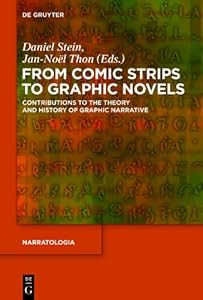Full year of comic theory books
2013 seems to be quite the year for books about theories of the comic medium! There’ve been at least four volumes that have come out this year, plus my own, The Visual Language of Comics, which is due out in December.
We started earlier in the year with Thierry Groensteen’s Comics and Narration, the anticipated follow up to his The System of Comics
. I planned to do a full review of this new book, but after awhile, I realized that there wasn’t much I had to say that wasn’t already articulated in my review of System of Comics. You may recall, I was not overly impressed. On the plus side, the writing in this new volume is much better—whether this is attributable to Groensteen or his translator, Ann Miller, is unknown, but either way it’s a great improvement that should be lauded. Beyond that, my previous critiques with regards to the content all still stand.
More recently, we’ve seen the publication of Barbara Postema’s Narrative Structure in Comics and Hannah Miodrag’s Comics and Language
. Both books take umbrage with the idea that the visual language in comics can be structured like language. Miodrag actually devotes the whole book to arguing against this view! I will likely post focused reviews of both these books in the coming weeks/months.
A similar viewpoint is taken by several of the chapters of the recent collection From Comic Strips to Graphic Novels, which features a wide range of articles about comic theory, all from perspectives in the humanities. I may or may not make posts discussing all or some of the chapters, since I only recently began reading it. As is often the case in big collections like these, some of the chapters seem much better than others.
Outside of Groensteen’s books, it’s actually surprising how nearly all of these books have some sort of disparaging viewpoint on “linguistic”-styled approaches to describing the structure of sequential images. Among these, Miodrag’s Comics and Language is the only one that is actually grounded in any sort of logical and reasoned argument in this regard (though it too has some limitations). The rest seem to have no idea what language is, how it might work, or how a “grammatical” system would or would not behave (though, this goes for Groensteen too—and he actually does claim comics are like language!).
I plan on addressing many of these concerns in my focused reviews for the books, but my broader response will appear in my own book at the end of the year.
Opinions aside, it’s nice to see so many books emerging that attempt to broach the topic with seriousness. Now we just have to work on the approach…


Comments
Thank you for this post. Although you haven't provided detailed reviews, I will certainly make note of the book titles. This is certainly helpful for my doctoral research. Looking forward to more posts.
Ha ha! Perhaps this post should be titled "Notes for possible upcoming reviews and further thoughts on a bunch of recent comic theory books." At any rate, I look forward to future posts.